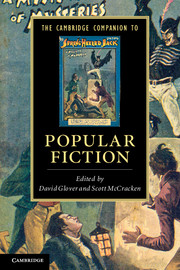Book contents
- Frontmatter
- Introduction
- 1 Publishing, history, genre
- 2 Fiction, theatre and early cinema
- 3 Television and serial fictions
- 4 The public sphere, popular culture and the true meaning of the zombie apocalypse
- 5 The reader of popular fiction
- 6 Reading time: popular fiction and the everyday
- 7 Gender and sexuality in popular fiction
- 8 Pulp sensations
- 9 Bestselling fiction: machinery, economy, excess
- 10 Comic books and graphic novels
- 11 Popular fiction in the digital age
- Further reading
- Index
- Cambridge Companions to …
5 - The reader of popular fiction
Published online by Cambridge University Press: 28 May 2012
- Frontmatter
- Introduction
- 1 Publishing, history, genre
- 2 Fiction, theatre and early cinema
- 3 Television and serial fictions
- 4 The public sphere, popular culture and the true meaning of the zombie apocalypse
- 5 The reader of popular fiction
- 6 Reading time: popular fiction and the everyday
- 7 Gender and sexuality in popular fiction
- 8 Pulp sensations
- 9 Bestselling fiction: machinery, economy, excess
- 10 Comic books and graphic novels
- 11 Popular fiction in the digital age
- Further reading
- Index
- Cambridge Companions to …
Summary
Writing in 1936 of his memories of working in a second-hand-bookshop-cum-lending-library, George Orwell painted a horrified pen portrait of a typical reader of popular fiction:
He read four or five detective stories every week for over a year, besides others which he got from another library. What chiefly surprised me was that he never read the same book twice. Apparently the whole of that frightful torrent of trash (the pages read each year would, I calculated, cover nearly three-quarters of an acre) was stored for ever in his memory. He took no notice of titles or authors' names, but he could tell merely by glancing into a book whether he had ‘had it already’.
Undiscriminating, without judgement, a passive consumer gulping down rubbish by the gallon: this is the reader of popular fiction as we most often see him (or, more usually, her) in the accounts of concerned commentators down the centuries. From anxieties about the salacious reading of early modern apprentices to imprecations against the novel-reading habits of Victorian middle-class girls, popular reading is repeatedly rendered through tropes of danger, passivity and lack of control. The reader is imagined as solitary, obsessed, his or her engagement with texts virtually masturbatory in the intensity of its self-pleasuring. But an examination of the lived experiences of what I shall call popular readers demonstrates something rather different: a more subtle, nuanced, critical engagement with texts – and one that is surprisingly often not solitary at all, but located within an active community of readers.
- Type
- Chapter
- Information
- The Cambridge Companion to Popular Fiction , pp. 86 - 102Publisher: Cambridge University PressPrint publication year: 2012
- 1
- Cited by



